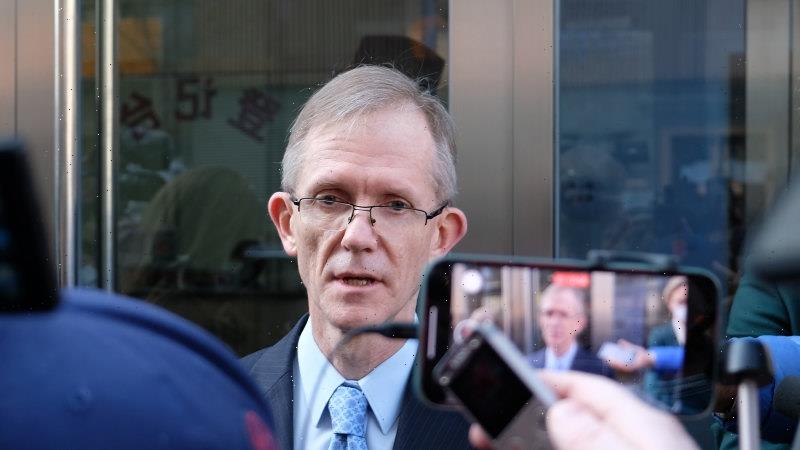Singapore: Australia’s ambassador to China has been blocked from entering a Beijing court to witness the trial of detained Australian journalist Cheng Lei.
Graham Fletcher said Chinese officials stopped him from entering Beijing’s No 2 Intermediate People’s Courthouse on Thursday morning as the trial of the Melbourne mother-of-two was about to get underway.
“We have no confidence in the validity of a process which is conducted in secret,” Fletcher said outside the court.
Graham Fletcher, Australian ambassador to China was blocked from entering the Beijing No 2 Intermediate People’s Court.Credit:Fairfax Media
“We have no information about the charges or allegations against Ms Cheng. That is part of the reason why we are so concerned we have no basis on which to understand why she has been detained.”
The former anchor for Chinese state media network CGTN has been held without trial for 19 months after being arrested on vague charges of illegally supplying state secrets in September 2020. She has not been able to speak to her 10-year-old and 12-year-old children in Melbourne since, and has been masked, blindfolded and restrained in the lead up to meetings with Australian consular officials.
Fletcher said on Thursday that Australian consular officials had satisfied themselves of her welfare when they last met with her on March 21 but “we want her to be able to talk to her children”.
“Considering the circumstances she is doing alright,” he said.
Australian officials asked to be present at Cheng Lei’s hearing on Thursday.Credit:Getty
China’s opaque judicial system has a conviction rate of 99 per cent. If convicted of illegally supplying state secrets, Cheng could face between five and 10 years in jail. In some serious cases that could extend to life behind bars.
In the weeks leading up to her arrest, Cheng had become increasingly critical of the Chinese Communist Party’s handling of the initial coronavirus outbreak in Wuhan in a series of posts on Facebook. The arrest of the University of Queensland graduate coincided with a sharp deterioration in Australia-China relations over national security and human rights disputes. The diplomatic breakdown has left the Australian government unable to lobby for her release at a ministerial level.
Beijing No.2 Intermediate People’s Court in Beijing where Australian Cheng Lei is on trial.Credit:Fairfax Media
Fletcher said the embassy had consistently made strong representations to the government in Beijing and the Chinese embassy in Canberra. He said under the consular agreement between China and Australia, Australian diplomats should have access to her trial. Fletcher said they were denied access because of China’s laws regarding national security cases.
Fellow Chinese-Australian Yang Hengjun is still awaiting sentencing on national security charges after he stood trial in a closed-door hearing in May 2021, more than two years after he was initially detained.
Cheng was born in China but finished university and started her career in Australia. She went on to work for US network CNBC before joining CGTN in 2012.
Cheng Lei and Yang Hengjun have been detained by Chinese authorities. Credit:The Age
The National Press Club in Washington, the Media, Entertainment & Arts Alliance of Australia, the National Press Club in Canberra and the International Federation of Journalists issued a statement on Wednesday condemning her treatment by Chinese authorities.
“She is being held on dubious charges that have yet to be substantiated with any evidence,” the press groups said. “We have urged the Chinese government to show compassion by allowing her to return to Australia, and we condemn her arbitrary detention and the secretive trial process she has endured.”
The Chinese Foreign Ministry said China’s judiciary handled cases in accordance with law and “fully protects the lawful rights of the person involved”.
Australian journalist Peter Greste, who was detained in Egypt for more than a year, and Australian academic Kylie Moore-Gilbert, who was detained in Iran for more than two years, said they were outraged at the conditions in which Cheng was reportedly being held, the lack of transparency about the evidence against her, and the excruciatingly slow pace of the Chinese judicial process.
“To date, the Chinese authorities have failed to present any evidence to support the charges, suggesting that Cheng Lei is not a criminal, but a bargaining chip in a wider political dispute,” they said in a statement.
More to come
Get a note directly from our foreign correspondents on what’s making headlines around the world. Sign up for the weekly What in the World newsletter here.
Most Viewed in World
From our partners
Source: Read Full Article









